12 Air Conditioning Facts and Statistics – 2025 Update
-

- Last updated:
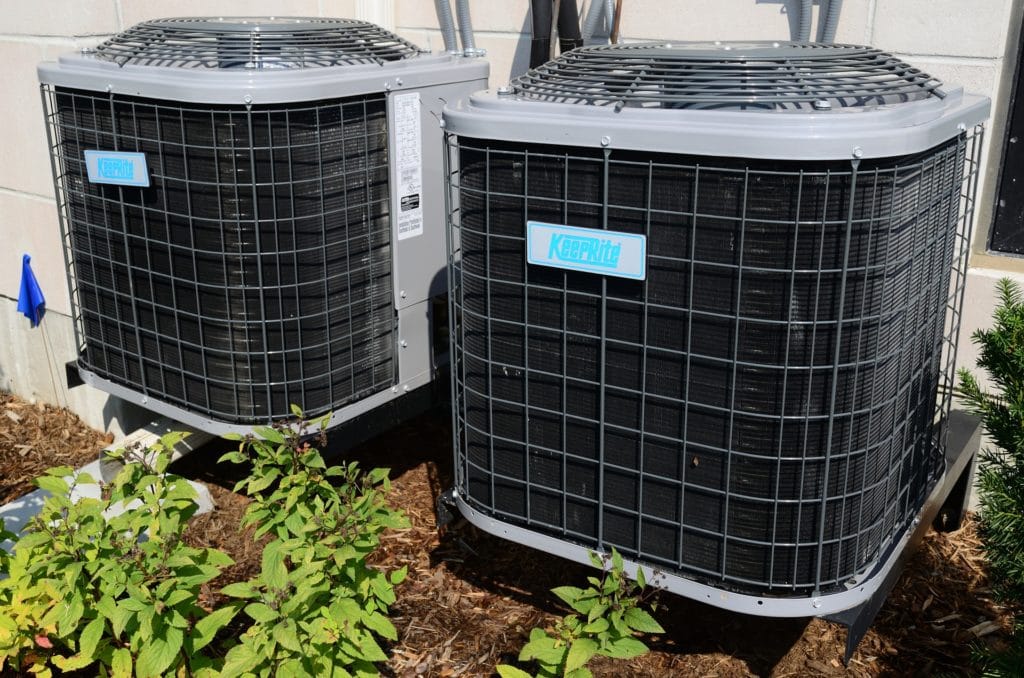
Note: This article’s statistics come from third-party sources and do not represent the opinions of this website.
In some parts of the world, the temperature can often reach dangerous levels. And in other places, it is downright uncomfortable all the time. Thankfully, really smart people have invented machines that keep us cold when the weather is hot! There are some considerations to take into account, and below we’ve listed some facts about air conditioning systems you might find interesting.
Click below to jump ahead:
- How Common Are Air Conditioners?
- Cost of Air Conditioners
- Health Benefits vs. Health Risks of Air Conditioners
 The 12 Air Conditioning Facts
The 12 Air Conditioning Facts
- 75% of all United States homes have air conditioning.
- 6% of all electricity in the United States is used by air conditioners.
- 61% of all Canadian households have air conditioning.
- Nearly 20% of all electricity used in buildings worldwide is from air conditioning.
- If not addressed, the demand for air conditioning will be at least tripled by 2050.
- ENERGY STAR air conditioner units use up to 40% less energy than comparable units sold in the last 10–15 years.
- Central air conditioning system installation runs $2,800–$6,000+ on average.
- Regular maintenance will save money on repair and operating costs.
- The average cost of running an air conditioner is $0.06–$0.88 per hour
- Inadequate air conditioning maintenance can cause indoor air pollution levels to be 2–5 times more concentrated than outdoors.
- A MERV 14 filter can effectively filter out up to 90% of airborne particles responsible for sickness.
- A study done by the International Epidemiology Association (IEA) showed improperly maintained air conditioning systems put workers at an increased risk of respiratory issues.
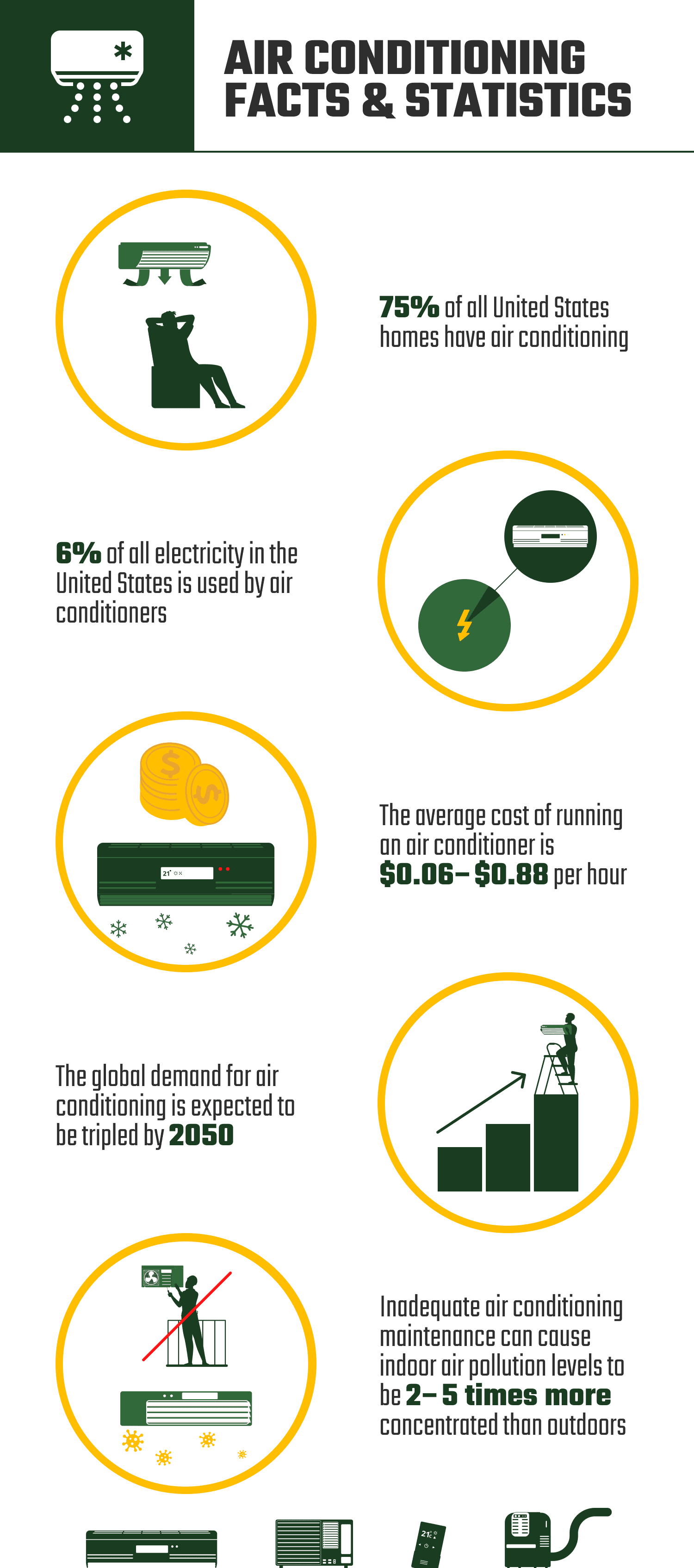
How Common Are Air Conditioners?
1. 75% of all United States homes have an air conditioner.
(EnergyGov)
It’s no shocker that so many homes in the United States have air conditioning systems. But the fact that these systems account for roughly 117 million metric tons of carbon dioxide released into the air every year is alarming. Luckily as technology improves, new products and designs are coming out that are more efficient and more environmentally friendly.
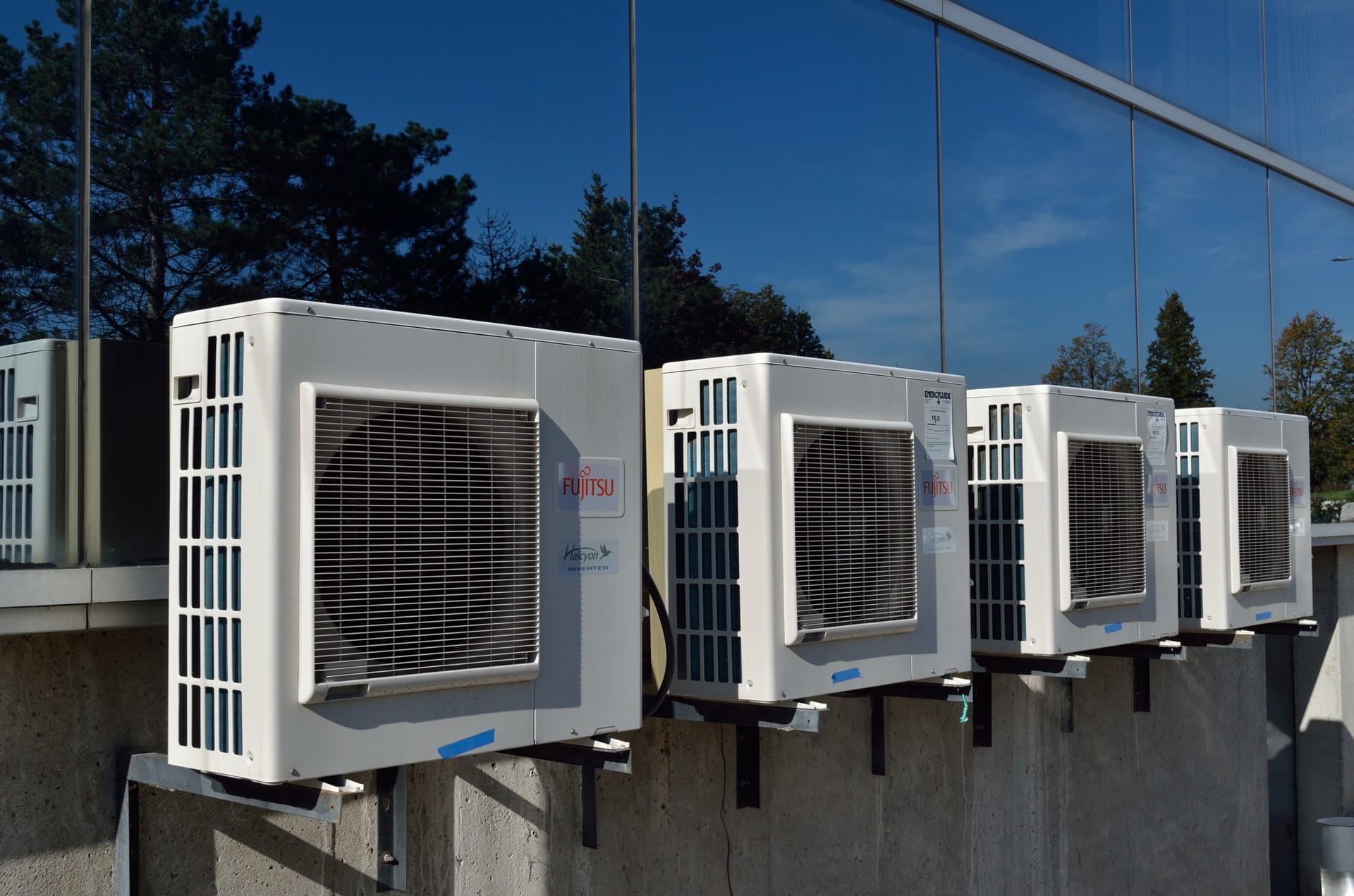
2. 6% of all electricity in the United States is used by air conditioners
(EnergyGov)
To put this into perspective, in 2020, the United States produced 4,007 billion kWh of electricity (EIA), which means that air conditioning systems alone used over 240 billion kWh of power! When one considers that many of the states have summer temperatures of 60–70 degrees, it is no wonder that these systems account for so much of the energy use.
3. 61% of all Canadian households have an air conditioner.
(StatCan)
This statistic might surprise some people, considering snow and cold are what come to mind for many people when they think of Canada. But many areas in Canada have sweltering hot summers that require more than just an open window and a fan to beat the heat. Of all the homes with air conditioners, 42% are central air, so they are not just an afterthought for the occasional hot day.
4. Nearly 20% of all electricity used in buildings worldwide is from air conditioning
(IEA ORG)
Over the years, the demand for cooling in residential, commercial, and industrial settings has drastically increased. As this demand has grown, so has the strain on the electrical systems in many countries. Right now, this demand seems to be at a manageable level, but that leads us to the following fact.
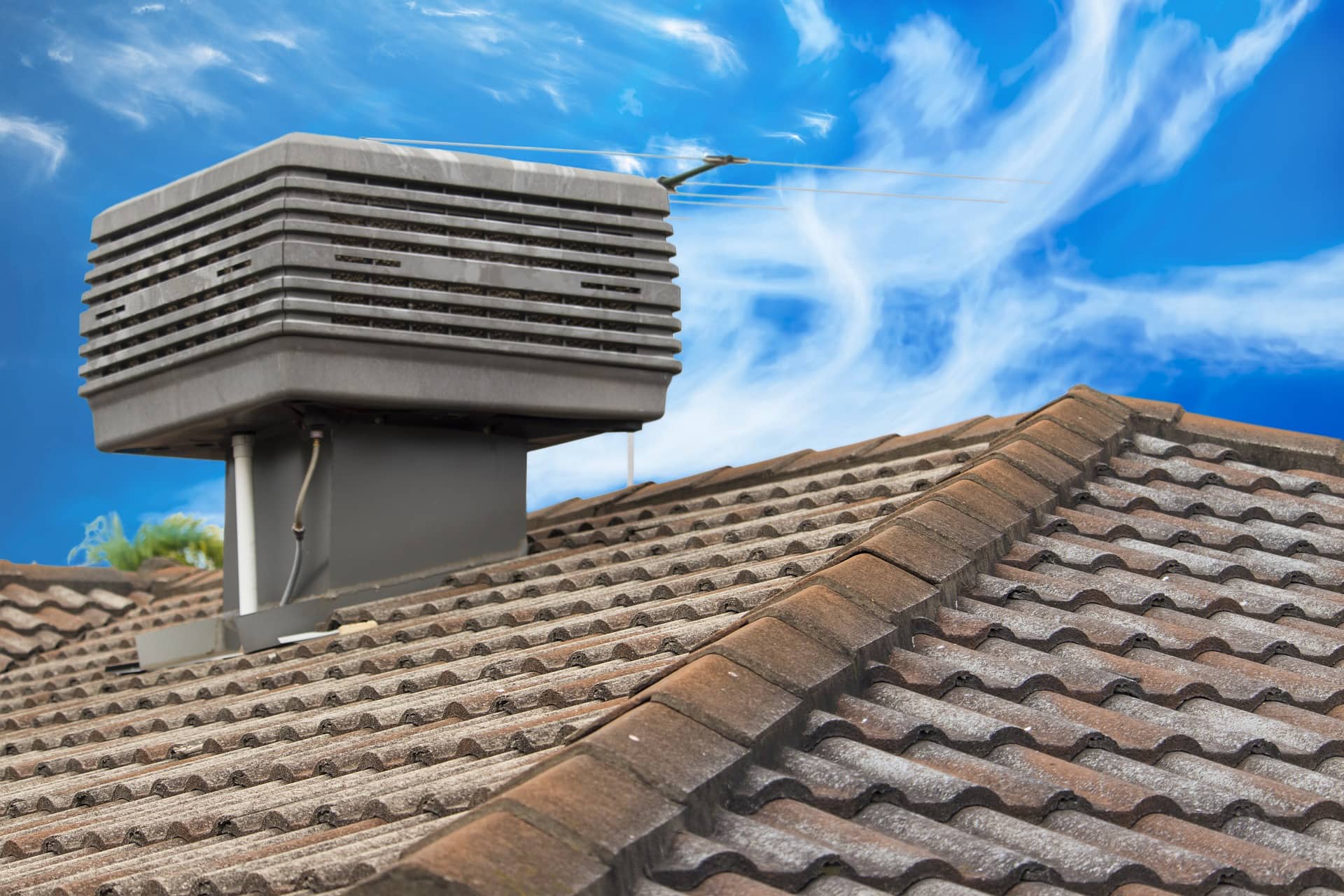
5. If not addressed, the demand for air conditioning will be at least tripled by 2050
(IEA ORG)
Because the International Energy Agency recognizes that the energy demand will skyrocket over the next few decades, it is working on creating a sustainable path forward to alleviate the strain this will undoubtedly cause on the electrical grids around the world.
Cost of Air Conditioners
6. ENERGY STAR air conditioner units use up to 40% less energy than comparable units sold in the last 10–15 years.
(Canada Gov)
Speaking of how much electricity air conditioning units use, it is essential to note that new technology such as ENERGY STAR rated units are almost twice as efficient compared to units purchased only a decade ago. We can expect this technology to improve even more as an environmentally friendly focus grows worldwide. Not only does this efficiency assist in the load on our national electrical systems, but it also translates into less money spent per year running an air conditioning system.
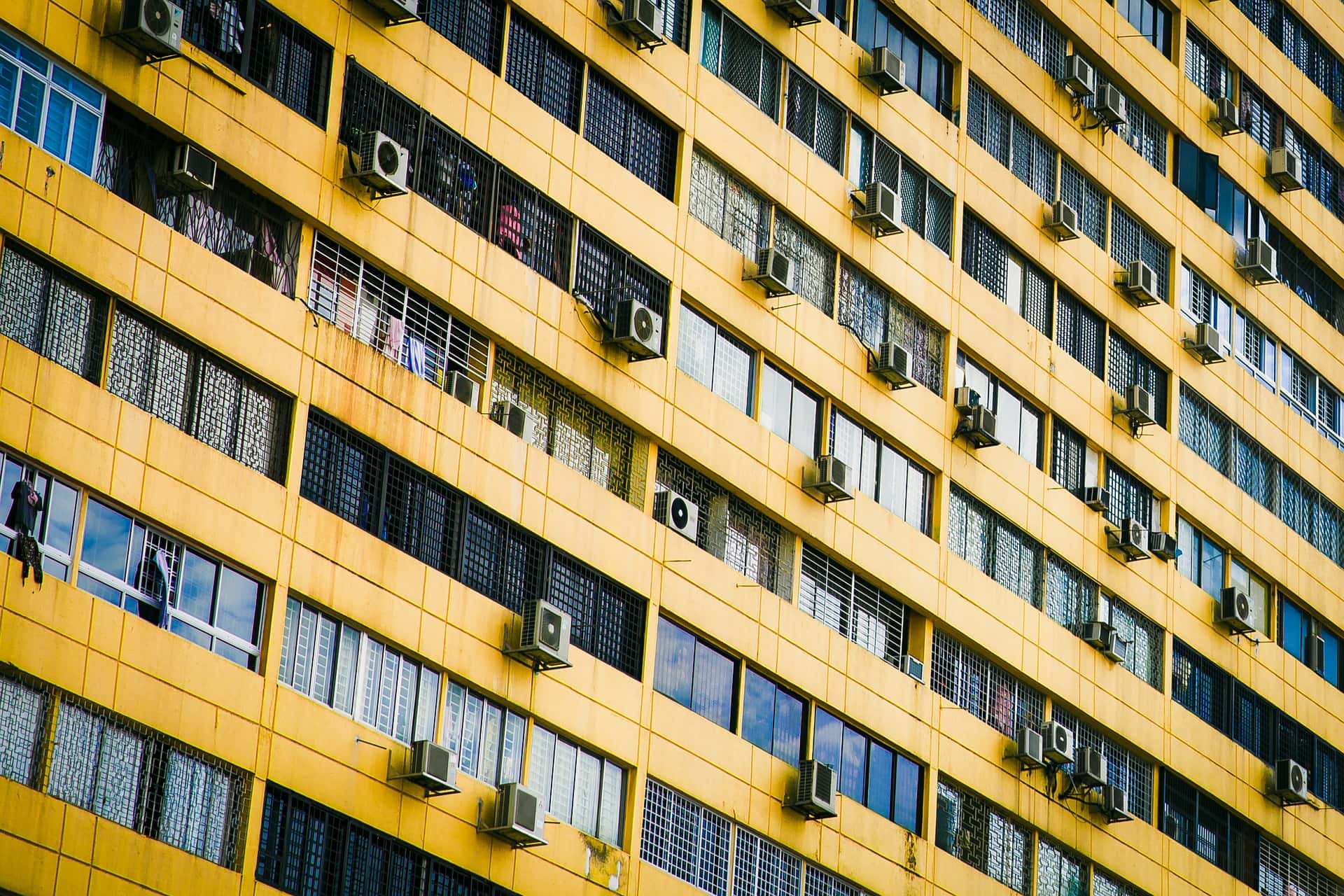
7. Central air conditioning system installation runs $2,800–$6,000+ on average
(Furnace Prices)
Many factors play into the final cost of an air conditioning system. Different units will have various features, such as programable controls or extra filtration. Another factor that plays into the final price is the size and brand of the system. Perhaps the most unpredictable factor is the contractor performing the installation; that is why it is important to research multiple contractors.
8. Regular maintenance will save money on repair and operating costs.
(Beaufort AC)
Like anything else that is mechanical, air conditioning system components wear out over time. Different factors play into how quickly the system will deteriorate, but the answer to saving money is to perform regular preventative maintenance. This way, if there is a part that is wearing out, it can be changed before it has a chance to cause catastrophic damage that ends up costing more.
9. The average cost of running an air conditioner is $0.06–$0.88 per hour
(Learn Metrics)
$0.06 per hour doesn’t seem like much, but if the air conditioning system is run most of the day, this can add over $500 per year to your electricity bill. Keep in mind that this is the low end. Suppose your system is bigger or is poorly maintained. In that case, the electricity bill can easily be more than $6,000 higher per year.
Health Benefits vs. Health Risks of Air Conditioners
10. Inadequate air conditioning maintenance can cause indoor air pollution levels to be 2–5 times more concentrated than outdoors.
(EPA)
Not only can improper maintenance result in higher-than-expected operational expenses for an air conditioning system, but it can cause air pollution levels to approach dangerous levels. This can be a huge problem, considering Americans spend around 90% of their time inside on average. If filters are not cleaned or changed at the recommended intervals, they will not be performing at their intended levels.
11. A MERV 14 filter can effectively filter out up to 90% of airborne particles responsible for sickness.
(CDC)
There are various filtration systems on air conditioners. Some are simple, like a window air conditioner, and some more complex such as the filters in a central air conditioning system. The CDC recommends a MERV 14 filter in a commercial or community setting. While it does not filter to the same micron level as a HEPA filter, it still boasts impressive filtration capabilities. Other filters such as MERV 8 or 13 may be suitable for a residential setting.
12. A study done by the International Epidemiology Association (IEA) showed improperly maintained air conditioning systems put workers at an increased risk of respiratory issues
(Oxford Academic)
This was an in-depth study done of office building occupants. Based on the findings, the IEA estimated an increase of visits to ENT’s of around 120% and a 40% increase in people calling in sick. Contaminates in the air conditioning systems were linked to many of these incidents. The importance of proper maintenance and cleaning is solidified as necessary more so after reading this study.
Frequently Asked Questions About Air Conditioning
Who do I call?
Who is an “air conditioning person” might seem like a simple question, but they don’t actually have that anywhere in their title. When you are looking for a contractor, you will be looking for an HVAC technician. They are specially trained in heating, ventilation, and air conditioning.
How large should my air conditioner be?
On average, 1 ton of air conditioning per 600 square feet is adequate. This average is very general, and there will be other factors to consider, such as house layout, insulation value, or sun exposure, to name a few. A qualified HVAC professional will take all factors into account and give the precise size needed to keep you comfortable and the system operating safely in your space. (Knight Plumbing)
Does it matter what company installs my central air conditioning system?
Unfortunately, scammers are out there who prey on people looking to make this big-ticket purchase. Though, it’s not always easy to spot a scam. These people may have a “legit” business, and they might even come to install a system for a great deal, but the craftsmanship will be shoddy at best and downright illegal and dangerous at worst. There are a few warning signs that you can watch out for.
- Pushy sales techniques: Sometimes it’s just sales, but other times they want you to purchase before you have a chance to investigate their business. If this happens to you—take extra care to look them up.
- Bad reviews (or no reviews): Bad reviews are usually a good indication of a company to avoid. But sometimes, if it’s a matter of no reviews, they may have the experience but be just starting out in business for themselves.
- Lack of knowledge: A professional contractor who takes their craft seriously will make sure they are always up-to-date on the latest codes and best practices and on all the latest products. If you run across a contractor who cannot discuss all your needs and give you the information you need, you may be better off finding someone else.
What kind of investment is this?
Investing in an air conditioning system is not a cheap endeavor, so it’s fair to ask how long it can be expected to last. Many air conditioners will last 15-20 years with proper maintenance. Another factor in their longevity will be the quality of the brand you choose initially. In theory, a more significant investment will pay off for longer.
 Conclusion
Conclusion
During a record heatwave in British Columbia, Canada, in 2021, many people were caught off guard. Unfortunately, there were almost 600 heat-related deaths (CBC News). This is not an isolated incident to BC. There are places worldwide where the heat spikes to dangerous levels; some areas more often than others.
Having an air conditioning system doesn’t have to break the bank. There is no need to invest in a central air system if the temperatures don’t get that high. But if they get to uncomfortable levels at times, maybe it is worth getting a window air conditioner that you can take in and out for comfort and peace of mind.
Featured Image Credit: Pixabay
Contents
 The 12 Air Conditioning Facts
The 12 Air Conditioning Facts
